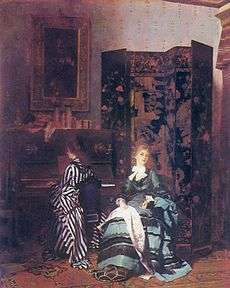Coromandel screen

A Coromandel screen is a Chinese wooden folding screen coated in dark lacquer that is carved before being painted with gold or varied colors. Some may be decorated with precious stones.[1]
The lacquer techniques for Coromandel screens, known as kuancai (literally "incised colors"), emerged during the late Ming Dynasty (1368–1644)[2] and were applied to folding screens to create dark screens incised, painted, and inlaid with decorative mother-of-pearl, ivory, or other materials.[3] Up to thirty layers of lacquer could be used. Each layer could have pictures and patterns incised, painted, and inlaid, and this created a design standing out against a dark background. The screens were made in China and appeared in Europe during the late 17th century.[4] The name refers to the Coromandel Coast in India where screens and other furnishings from China were loaded onto ships carrying goods to Europe.
The famous fashion designer Coco Chanel was an avid collector of Chinese folding screens, especially the Coromandel screens, and is believed to have owned 32 folding screens of which eight were housed in her apartment at 31 rue Cambon, Paris.[5] She once said:
- I've loved Chinese screens since I was eighteen years old. I nearly fainted with joy when, entering a Chinese shop, I saw a Coromandel for the first time. Screens were the first thing I bought.[6]
See also
References
- ↑ What is a coromandel screen?. Quezi. Retrieved 23 September 2011
- ↑ Clunas, Craig (1997). Pictures and visuality in early modern China. London: Reaktion Books. p. 61. ISBN 978-1-86189-008-5.
- ↑ Cooper, Dan (1999). "Folding Grandeur". Old House Interiors. 5 (1): 30–36. ISSN 1079-3941.
- ↑ Coromandel screen. Encyclopædia Britannica. Retrieved 23 September 2011
- ↑ "COCO CHANEL'S APARTMENT THE COROMANDEL SCREENS". Chanel News. June 29, 2010.
- ↑ Delay, Claude (1983). Chanel Solitaire. Gallimard. p. 12. Cited in: "COCO CHANEL'S APARTMENT THE COROMANDEL SCREENS". Chanel News. June 29, 2010.